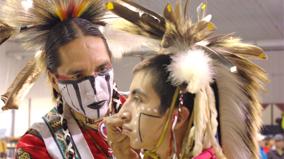this river
This short documentary offers an Indigenous perspective on the devastating experience of searching for a loved one who has disappeared. Volunteer activist Kyle Kematch and award-winning writer Katherena Vermette have both survived this heartbreak and share their histories with each other and the audience. While their stories are different, they both exemplify the beauty, grace, resilience, and activism born out of the need to do something.

Details
-
directorErika MacPhersonKatherena Vermette
-
writerKatherena VermetteErika MacPherson
-
producerAlicia Smith
-
executive producerDavid Christensen
-
narrationKatherena Vermette
-
participantKyle KematchCalvin AlexanderKatherena Vermette
-
director of photographyIris Ng
-
location sound mixerAnita Lubosch
-
sound designerAnita Lubosch
-
sound editorAnita Lubosch
-
picture editorErika MacPherson
-
digital intermediate technicianMarcel Kreutzer
-
workflow consultantMarcel Kreutzer
-
boat driverKyle KematchJan Bass
-
sound mix engineerBruce Little
-
on-line colouristTony Wytinck
-
production coordinatorFaye YonedaJasmine Pullukatt
-
production supervisorMark Power
-
production assistantKristin Poyntz
-
program administratorBree BeachGinette D'Silva
-
centre operations managerDarin Clausen
-
director generalMichelle van Beusekom
-
marketing managerLeslie Stafford
-
marketing coordinatorMichelle Rozon
-
stills photographerChris Friesen
-
film poster designSébastien Aubin
-
transcriptionSharon MurphyPatricia Garry
-
strategic advisorEtoile Stewart
Education
A documentary that can be used to prompt class discussions, action initiatives and debates about social justice in an Indigenous context. How is the justice system’s undermining of the issue of missing Indigenous people reflective of the current and historical treatment and disregard for Indigenous lives? Is it necessary for Indigenous people and allies to form grassroots groups that advocate for fair and just treatment? What actions can be taken to lift up people and create a more ethical and just society? What can you do to combat violence and racism against Indigenous peoples in Canada? Why do racism, prejudice and discrimination against Indigenous peoples persist in Canada?

















